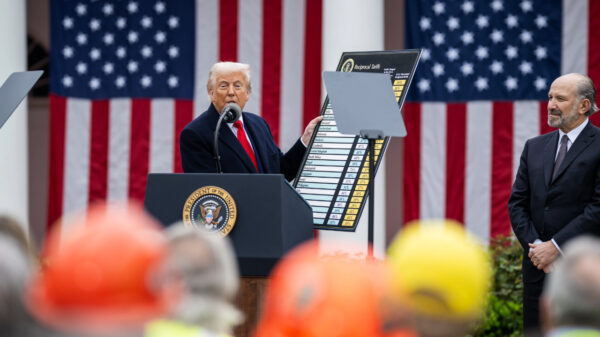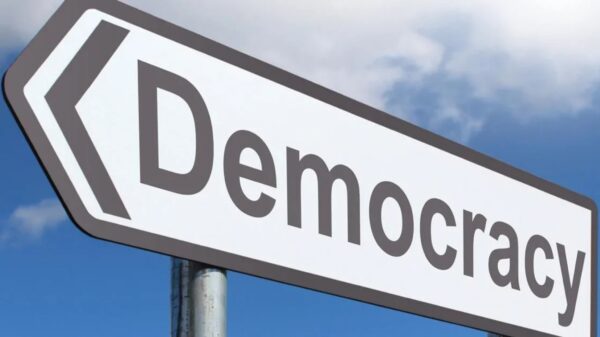Editor-in-Chief Fintan Hogan suggests that American protectionism, for all of its downsides, opens a brief window for a ‘Climate Club’ to emerge.
Things are continuing to heat up between the United States (US) and China (the PRC). Secretary Blinken called recent talks with Chinese counterparts “candid”, but perhaps ‘hostile’ would have been a more appropriate word. The bilateral meetings were so successful that it took under a fortnight before the US was once again ratcheting up sanctions, and China was responding by tightening anti-espionage legislation. So much for the “obligation and responsibility to manage our relationship”.
Yet Secretary Blinken can still congratulate himself on a job well done, because in America it’s China-bashing that’s in vogue, and damn the consequences. This is why President Biden called Xi Jinping a ‘dictator’ at a recent fundraising event in California. That’s not to say that Biden is incorrect, nor that the Chinese Communist Party’s (CCP’s) human rights record is anywhere near stellar. But this is indeed “blatant political provocation” – and it’s here to stay.
Since the Trump era, the US has enforced tariffs on billions of dollars of imports every year, at enormous cost to both American consumers and Chinese companies. In 2019, one critic said, “Trump doesn’t get the basics. He thinks his tariffs are paid for by China. Any beginning econ student at Iowa or Iowa State could tell you the American people are paying his tariffs”. That critic then went on to win the Whitehouse, keep these restrictions in place, impose further export controls and call the package ‘Bidenomics’.
This is Bidenomics, folks. pic.twitter.com/nmATaelkw4
— President Biden (@POTUS) June 28, 2023
One has to wonder if he has consulted the students of Iowa State about his economic policy.
China has done much the same in response, imposing tariffs on almost 10,000 different products. Around $100 billion of American goods are now subject to trade restrictions. Overall trade is still creeping up, but ‘interdependence’ is a dirty word on both sides of the Pacific. US Trade Representative Catherine Tai calls China a “challenge to the fundamental premise of the globalization project”; President Xi complains of “suppression” and “encirclement”.
While not yet a second Cold War, the US and PRC will remain at loggerheads for the foreseeable future. This will have a chilling effect on global trade, institutions and optimism. Yet for all of its obvious downsides, this frigid relationship could actually be used to help deal with our warming world. This possible benefit to the decarbonisation effort is far from certain, and will only come about with a string of contentious political decisions. But as the door on free trade closes, a green window opens.
President Biden is casting around for some justification as to why the relationship with China has to be so aggressive. Throughout the tit-for-tat escalations of the last decade, the actual cause of the bad relationship has been generally forgotten. Some now suggest that it’s because of the US’ ironclad commitment to defending Taiwan. Others, that the democratic US has a responsibility to resist the autocratic China. In reality, it’s because America’s global leadership is threatened. “Antagonism between top dogs and rising powers is part of the human story.”
But here’s the catch – American politicians can’t admit that. It would be a tacit concession that China has the potential to lead the international system, be the hub of the global economy and make the rules of the game. The only people who find this less palatable than American politicians are American voters. The public won’t pick leaders who tell them that they’re weak. So the Biden administration has landed on the idea of ‘resisting autocracy’, a polite re-phrasing of Trumpish rhetoric which lambasted ‘the Dragon’. China is hence excluded by the mantra of ‘free trade with free nations’. This has been parroted in other democracies, including the UK and Canada. It is a fiction.
Saudi Arabia benefits from American arms, cash and cooperation, despite Biden previously promising to make Mohammed bin Salman a “pariah” for ordering the assassination of journalist Jamal Khashoggi. The president now fist-bumps the Crown Prince. Last year, Qatar was designated a ‘major ally’ of the US, despite enormous issues with workers’ rights and not even the pretence of democracy. The US is currently attempting to use Kazakhstan’s dissatisfaction with Russia’s invasion of Ukraine to win over a new regional ally, conveniently ignoring its endemic corruption, state-controlled media and quasi-democratic government. Talk of ‘human rights diplomacy’ rings hollow as a justification for the China trade war. The US has turned enough blind eyes to make a blind spider.
‘Free trade with free nations’ is a dud. That’s not to say that the US should neglect human rights, democratisation or liberty from its foreign policy. America has and should continue to advocate for a freer world. But normal trading relationships cannot hinge on this caveat, considering that under 30% of people today live in democracies. It’s impractical to isolate, embargo or ignore all of these governments.
There is, however, an alternative. If the Biden administration wants a reasonable justification to punish China – one that would help the world – it should look to its environmental impact. A progressive, domestic carbon tax, replicated by the tariff system which American politicians seem desperate to enact, would be a far better system. I call this ‘fair trade with fair nations’.
Proposed by William Nordhaus in his 2015 paper ‘Climate Clubs: Overcoming Free-riding in International Climate Policy’, a group of large economies could agree on a shared, uniform carbon tax to ‘price in’ emissions. The idea is that firms then appropriately adjust their practices to adopt green solutions, with ‘carbon exposure’ factored into decision-making. Then, in order to not disadvantage domestic firms, this group of countries (the ‘Climate Club’) replicate this tax through their import tariffs. These tariffs should be slightly higher than the domestic taxes to overcome transparency issues and penalise non-member countries for being ‘outside of the Club’. Goods from inside the bloc move freely; those from outside have to pay to compensate for their carbon footprint. Other countries are then incentivised to join the accredited taxation scheme since their corporations will have to pay the price either way – it’s better to tax the revenue domestically than let Club members extract it through sanctions.
Trans-national corporations who wish to export to Club countries have to either verifiably carbon account their products, or face prohibitive, expensive and time-consuming import restrictions. Therefore not only does this decarbonise the economies of members, but it diffuses best practice worldwide, as large companies cannot simply offshore environmental costs. Nordhaus concludes that sanctions are necessary to create such a Club, as otherwise there is too great an incentive to free-ride. This is great news – if re-directed, these sanctions might not be in vain. So ‘fair trade with fair nations’ would penalise countries based on the simple premise that those who eschew their environmental responsibility aren’t playing fair.
China’s current environmental commitments are rated as ‘highly insufficient’ and future emission estimates are being continually revised upwards. Its energy grid is still hugely reliant on coal and, while it offered a net-zero 2050 plan with much fanfare two years ago, the Xi government is returning to investments in coal. Since the US is determined to sanction China (simply for them having the audacity of being a rising power), wouldn’t a more justifiable, plausible and laudable target be to curtail this reckless pollution?
The Climate Club concept has given me a shred of optimism about our ability to overcome the ecological emergency. As unpalatable as it sounds, it’s far more plausible that the richest countries will coerce others into decarbonisation than the vague hope that we’ll reach some magical global compromise. All players have an incentive to free ride until they are coaxed or compelled into a new system. Industrialising countries also have genuine grievances over the historic carbon emissions of rich countries, and there is a plausible case for climate reparations, but that doesn’t change the fact that the world’s carbon budget is falling dangerously quickly. The strong arm may be more effective than the soft word.
‘Fair trade with fair nations’ has another advantage over ‘free trade with free nations’ in that it gives China a way to de-escalate. At the moment, Beijing faces an aggressive Washington with little appetite for reproachment. But it makes perfect sense – for both sides – to build a safety valve into this geopolitical conflict. China faces huge issues, including a looming demographic cliff and inevitably slowing economic growth. In this sense, time is not on Xi’s side. By anchoring the sanctions against a metric which the CCP has some power to change, this hands Beijing a switch that it’s never had before. Want closer relations with the US? Close your coal mines, invest in solar and clean up your act – the rewards for both sides will be immediate and tangible. The current US-China trade war is careering forwards with the brakes cut: ask yourself how either side could de-escalate now, even if they wanted to. But under the Climate Club system, if the CCP did decide to become a ‘fair partner’ in the fight against climate change, it could once again enjoy the benefits of ‘fair trade’. De-escalation and de-carbonisation, rolled into one. Wouldn’t that make the world a safer place?
In practice, the Climate Club faces many challenges in getting off the ground. The G7 is attempting to create something similar, but it remains to be seen if it receives much buy-in. It would open thorny conversations with Gulf states, India and Brazil, not to mention a network of international companies with vested interests. Yet in the context of a ridiculously hot summer, it’s become patently clear that we need astronomical progress, astronomically quickly.
It’s time to think creatively about two of the biggest issues that we face today. Could we use a cold war to cool our warming planet? A pragmatic reframing of the US-China dispute from ‘free nations’ to ‘fair nations’ would marry the worst instincts of American politicians with the better interests of the world. At the moment Washington is chasing an undefined goal along the highway to hell, leaving neither themselves nor Beijing an off-ramp. Instead of holding out for an impossible goal (a sudden democratic revolution), we should aim for a plausible one. A Climate Club would teach each other to be good neighbours, without needing to be best of friends.
















